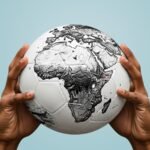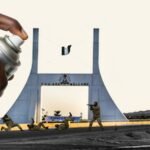Unveiling the Veil of Unity: Morocco’s Ascendancy in Football Diplomacy and Continental Brotherhood
In the heart of North Africa, where the Sahara’s golden dunes meet the Atlantic’s azure waves, Morocco stands as a beacon of Pan-African aspiration through its burgeoning role in hosting major football tournaments. The Atlas Lions, emblematic of Moroccan resilience and prowess, roar not just on the field but in the grand arena of continental unity. By securing rights to a cascade of men’s, women’s, and youth competitions, Morocco embodies the Pan-African ideal—a philosophy rooted in the shared struggles and triumphs of African peoples, championed by visionaries like Kwame Nkrumah and Julius Nyerere. This hosting spree transcends mere sport; it weaves a tapestry of solidarity, fostering cultural exchanges, economic collaborations, and a collective African identity in the face of global challenges.
Football, often referred to as the “beautiful game,” serves as a powerful vehicle for Pan-Africanism in Morocco’s context. It unites diverse nations under the banner of a shared passion, echoing the continent’s history of liberation movements, where sports boycotts against apartheid-era South Africa galvanized unity. Morocco’s investments in infrastructure and event management reflect a commitment to elevating African football on the world stage, countering narratives of underdevelopment and promoting intra-African dialogue. As the nation prepares for events like the Africa Cup of Nations (AFCON) and beyond, it positions itself as a bridge between North and Sub-Saharan Africa, healing historical divides and amplifying voices from across the continent. This article explores Morocco’s historical legacy, prospects, infrastructural resilience, tourism synergies, and inherent challenges, all through the lens of Pan-African harmony.
Whispers from the Winds of Time: Morocco’s Enduring Legacy in African Football Stewardship
Morocco’s narrative in hosting football tournaments is a chronicle etched in the sands of time, blending triumphs, tribulations, and a steadfast pursuit of Pan-African cohesion. The journey commenced in 1988 when Morocco first hosted the AFCON, transforming cities like Casablanca and Rabat into vibrant hubs of continental camaraderie. Eight teams converged, with Cameroon’s victory over Nigeria symbolizing the unpredictable thrill of African football. This event was more than a competition; it was a manifestation of Pan-Africanism, where players from disparate nations shared pitches, stories, and aspirations, reinforcing the idea that Africa’s strength lies in its diversity.
Building on this foundation, Morocco’s ambitions grew, though not without hurdles. Unsuccessful bids for multiple FIFA World Cups—1994, 1998, 2006, 2010, and 2026—highlighted the geopolitical intricacies of global sports governance, often pitting African unity against external influences. A poignant chapter unfolded in 2014 when Morocco relinquished hosting the 2015 AFCON amid a regional health crisis, leading to relocation and a brief suspension. This episode, while challenging, underscored lessons in resilience and collective responsibility, aligning with Pan-African principles of mutual support during adversities.
In the realm of women’s and youth football, Morocco has pioneered inclusivity, hosting the Women’s Africa Cup of Nations (WAFCON) in 2022 and 2024. The 2022 tournament, a North African first, saw South Africa’s triumph amid celebrations of female empowerment, echoing the legacy of Pan-African feminist icons like Funmilayo Ransome-Kuti. The 2024 edition, with Nigeria’s tenth title, further amplified women’s voices, promoting gender equity across borders. These hostings have nurtured grassroots movements, inspiring young girls from Senegal to Ethiopia to dream big, thus knitting a tighter fabric of continental solidarity. Morocco’s clubs, such as Raja Casablanca and Wydad, have long dominated African competitions, exporting talent and fostering exchanges that embody Pan-African economic and cultural integration.
Horizons of Shared Glory: Morocco’s Forthcoming Symphony of Continental Competitions
As the sun rises over the Atlas Mountains, Morocco’s calendar is filled with tournaments that promise to unite African nations in a chorus of competition and cooperation. This lineup, unprecedented in scope, exemplifies Pan-Africanism by creating platforms where rivalries dissolve into mutual respect, and national pride evolves into continental pride.
The 2025 AFCON, unfolding from December 21, 2025, to January 18, 2026, marks Morocco’s return as host after nearly four decades. Twenty-four teams will clash in nine stadiums across six cities—Rabat, Casablanca, Tangier, Agadir, Marrakech, and Fez—each match a testament to Africa’s vibrant football mosaic. As the Atlas Lions seek glory on home turf, buoyed by their 2022 World Cup semifinal feat, the tournament will facilitate discussions on shared challenges such as climate resilience and youth unemployment, aligning with Pan-African agendas.
Complementing this, the 2026 WAFCON, Morocco’s third consecutive hosting, is set for March 2026, serving as a qualifier for the 2027 FIFA Women’s World Cup. This continuity underscores Morocco’s dedication to women’s empowerment, a core Pan-African value, drawing teams like Nigeria and South Africa into a sisterhood of sport. The event will spotlight emerging talents, fostering mentorship across generations and borders.
The pinnacle arrives with the 2030 FIFA World Cup, co-hosted with Spain and Portugal, featuring centenary matches in South America. Morocco’s allocation of approximately one-third of the 104 games will showcase its role in bridging continents, but more crucially, it revives Pan-African echoes from South Africa’s 2010 hosting. Preparations include the establishment of a new FIFA regional office in Morocco, symbolizing Africa’s growing influence, and investments that link AFCON infrastructure to World Cup readiness, promoting sustainable development across the continent.
Morocco’s portfolio expands further: the U-17 Africa Cup of Nations in 2025 and 2026, the FIFA U-17 Women’s World Cup annually from 2025 to 2029, the 2029 FIFA Club World Cup, and the FIFA Arab Cup. These youth-focused events nurture future stars, embodying Pan-Africanism’s emphasis on investing in the next generation to build a united, prosperous Africa.
Bastions of Brotherhood: Infrastructural Pillars Upholding Pan-African Aspirations
Morocco’s stadiums stand as monumental tributes to Pan-African engineering and communal spirit, where concrete and steel forge bonds of unity. The Grand Stade Hassan II, nearing completion by 2028 with 115,000 seats, incorporates sustainable innovations such as solar energy, reflecting Africa’s collective push toward greener futures amid climate vulnerabilities.
For the 2025 AFCON, upgraded venues like Rabat’s Prince Moulay Abdellah Stadium (69,500 seats) and Tangier’s Ibn Batouta Stadium (65,000) prioritize inclusivity, with features that symbolize Pan-African accessibility for diverse fans. Agadir’s Adrar Stadium and Marrakech’s stadiums, each with a capacity of around 45,000, blend modern technology with cultural motifs, inviting visitors to experience Morocco’s heritage as part of a broader African narrative.
Infrastructure investments amount to $4.2 billion in airport expansions and high-speed rail projects, facilitating seamless travel for African delegations. These developments, overseen by the newly established Fondation Maroc 2030, ensure legacies that benefit communities in the long term, preventing the “white elephant” syndrome and promoting equitable growth in line with Pan-African economic solidarity.
Scoring Cultural Exchanges: Tourism as the Equalizer in Pan-African Narratives
Football tournaments in Morocco catalyze tourism, transforming pitches into portals of Pan-African discovery and mutual enrichment. The influx during WAFCON 2024 invigorated cities, where fans from across Africa savored tagines in Marrakech’s medinas or explored Fez’s labyrinthine souks, fostering interpersonal connections that transcend borders.
The 2030 World Cup is expected to generate a 8-10% surge in tourism, bringing in billions while highlighting sites such as the Atlas Mountains and Essaouira’s beaches. This economic boon aligns with Pan-Africanism by redistributing wealth through intra-African travel, countering neocolonial dependencies. However, sustainable practices are vital to mitigate overtourism, ensuring that local communities thrive and cultural heritages are preserved as shared African treasures.
Confronting the Crossbars: Obstacles in Morocco’s Quest for Pan-African Harmony
Amid the euphoria, challenges loom like formidable defenders, testing Morocco’s resolve in embodying Pan-African ideals. Infrastructure deadlines, compounded by seismic risks, demand vigilant oversight to avoid disruptions that could fracture continental trust.
Diplomatic nuances, such as historical tensions over territorial issues, occasionally shadow bids, as seen in past World Cup voting patterns. However, these serve as catalysts for dialogue, reinforcing Pan-Africanism’s call for resolution through unity. Ethical concerns, including animal welfare and equitable resource distribution, require inclusive policies to ensure all Africans benefit.
Opportunities emerge in leveraging football for social reforms, like gender equality and youth empowerment, turning challenges into victories for a more cohesive continent.
The Triumphant Whistle: Morocco’s Eternal Imprint on Africa’s Unified Football Saga
In the grand finale of Morocco’s hosting epic, the nation emerges as a vanguard of Pan-Africanism, where football’s rhythm synchronizes the heartbeat of a continent. From historical milestones to future spectacles, Morocco’s endeavors cultivate unity, prosperity, and pride. By overcoming hurdles with grace, it inspires a Pan-African renaissance, proving that on the pitch of life, Africa’s collective spirit is unbeatable.











